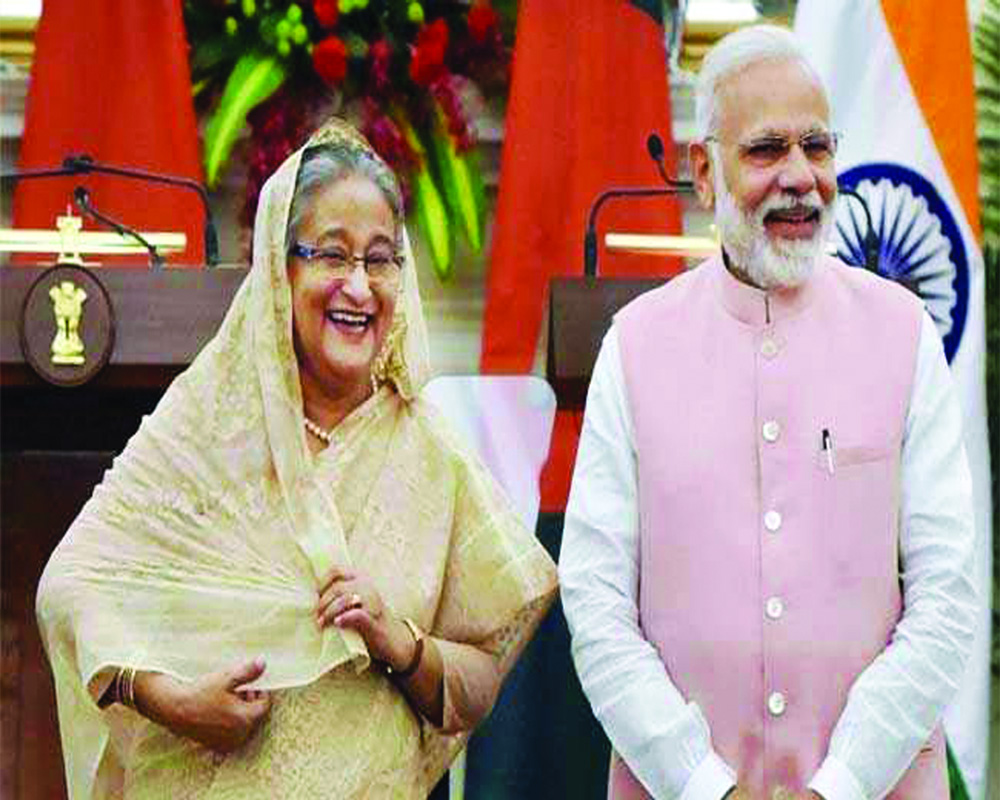Ties between New Delhi and Dhaka would benefit both countries and Modi’s trip should take this forward
Prime Minister Narendra Modi’s forthcoming visit to Dhaka on March 26 is quite significant as it will be his first foreign trip after the Covid- 19 outbreak. It is expected to consolidate bilateral ties as Bangladesh is a gateway to southeast Asia and part of Modi’s ‘Act East’ policy. In the last six years, the Prime Minister has established a rapport with his Bangladeshi counterpart Sheikh Hasina. There have also been frequent ministerial and official-level visits and continuous interaction between New Delhi and Dhaka. External Affairs Minister S Jaishankar visited Dhaka last week to pave the way for the Prime Minister’s visit as part of Bangladesh’s celebrations of 50 years of independence. It also marks a decisive victory of the Indian Army over Pakistan. Coincidentally, Modi’s visit is just before the first phase of the Assembly polls in West Bengal and Assam, which share common borders with Bangladesh. The enormous improvement in bilateral ties in the recent years led Hasina to call it a “golden period.”
Yet, the steps taken in the domestic sphere during Modi’s second term are causing concern to Bangladesh, even though New Delhi contends that it is a domestic matter. These measures include the abrogation of Article 370 in Jammu and Kashmir (J&K), the passing of the controversial Citizenship (Amendment) Act (CAA) and the creation of the National Register of Citizens (NRC).
During Modi’s trip, the two leaders are expected to discuss bilateral issues, especially the matter of Teesta river water sharing. Despite achieving breakthroughs in several areas in India-Bangladesh ties, both countries are yet to resolve the issue and Teesta has emerged as an emotive matter in Bangladesh and West Bengal. Dhaka has been pushing New Delhi to settle it early as Teesta water is vital for irrigation during the dry season in the northern part of Bangladesh. The Modi Government had successfully persuaded West Bengal Chief Minister Mamata Banerjee on the tricky Land Boundary Agreement and the enclaves’ resolution, but Didi has stuck to her guns on Teesta. Jaishankar, during his recent Dhaka visit, said, “The position of the Government of India has not changed.” However, it is a political necessity for both sides to find a solution soon. A deal would help New Delhi get more political leverage over China’s growing influence, particularly in the Bay of Bengal region. It will also help Hasina politically. Meanwhile, a desperate Dhaka has turned to Beijing and a massive project funded by China has been adopted to manage the Teesta river.
On the domestic side, illegal immigration has been a political and electoral issue for the BJP since 1996 when its national executive in Bhopal passed a resolution on it. Even the 2019 manifesto said, “We will continue to undertake effective steps to prevent illegal immigration in the north eastern States.” The other issue is that of Rohingya refugees. Millions of Muslims from the Rakhine province of Myanmar, following the Tatmadaw’s crackdown in 2017, fled to Bangladesh and other neighbouring countries, including India. New Delhi is caught in a dilemma between two close strategic neighbours, Myanmar and Bangladesh.
Connectivity is another important area where both the countries are focusing, and many new projects are on the way and New Delhi has come to Dhaka’s rescue by exporting nine million vaccines as part of its Covid diplomacy. On its part, Bangladesh is all set to graduate out of the Least Developing Countries with its GDP growth of eight per cent. New Delhi must keep up the partnership that allows for economic growth, defence cooperation, connectivity and improved developmental parameters for both nations. A collaboration between India and Bangladesh would benefit both countries. New Delhi must not lose the moment to take the ties forward.
(The writer is a senior journalist. The views expressed are personal)


























